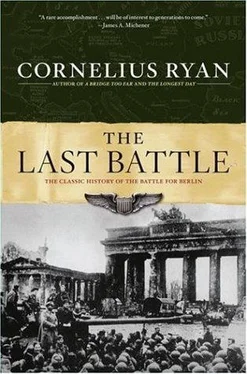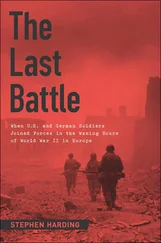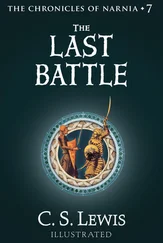Cornelius Ryan - The Last Battle
Здесь есть возможность читать онлайн «Cornelius Ryan - The Last Battle» весь текст электронной книги совершенно бесплатно (целиком полную версию без сокращений). В некоторых случаях можно слушать аудио, скачать через торрент в формате fb2 и присутствует краткое содержание. Город: New York, Год выпуска: 1995, ISBN: 1995, Издательство: Simon & Schuster Paperbacks, Жанр: military_history, История, на английском языке. Описание произведения, (предисловие) а так же отзывы посетителей доступны на портале библиотеки ЛибКат.
- Название:The Last Battle
- Автор:
- Издательство:Simon & Schuster Paperbacks
- Жанр:
- Год:1995
- Город:New York
- ISBN:978-0-684-80329-6
- Рейтинг книги:3 / 5. Голосов: 1
-
Избранное:Добавить в избранное
- Отзывы:
-
Ваша оценка:
- 60
- 1
- 2
- 3
- 4
- 5
The Last Battle: краткое содержание, описание и аннотация
Предлагаем к чтению аннотацию, описание, краткое содержание или предисловие (зависит от того, что написал сам автор книги «The Last Battle»). Если вы не нашли необходимую информацию о книге — напишите в комментариях, мы постараемся отыскать её.
The Last Battle The Last Battle
The Last Battle — читать онлайн бесплатно полную книгу (весь текст) целиком
Ниже представлен текст книги, разбитый по страницам. Система сохранения места последней прочитанной страницы, позволяет с удобством читать онлайн бесплатно книгу «The Last Battle», без необходимости каждый раз заново искать на чём Вы остановились. Поставьте закладку, и сможете в любой момент перейти на страницу, на которой закончили чтение.
Интервал:
Закладка:
Others, while hoping for the best, prepared for the worst. Soberminded Pia van Hoeven and her friends Ruby and Eberhard Borgmann reluctantly reached the conclusion that only a miracle could keep the Russians from getting to Berlin first. So they jumped at the invitation of their good friend, the jovial, fat-cheeked Heinrich Schelle, to join him and his family when the battle for the city began. Schelle managed Gruban-Souchay, one of the most famous wine shops and restaurants in Berlin, situated on the ground floor below the Borgmanns. He had turned one of his cellars into a resplendent shelter, complete with Oriental rugs, draperies and provisions to withstand the siege. There was little food except for potatoes and canned tuna fish, but there were ample supplies of the rarest and most delicate of German and French wines in the adjacent wine cellar—plus Hennessy cognac and case after case of champagne. “While we wait for God knows what,” he told them, “we might as well live comfortably.” Then he added: “If we run out of water—there’s always the champagne.”
Biddy Jungmittag, 41-year-old mother of two young daughters, thought that all the talk about the Americans and British coming was—in her own words—“just so much tripe.” The British-born wife of a German, she knew the Nazis only too well. Her husband, suspected of belonging to a German resistance group, had been executed five months before. The Nazis, she thought, would fight as fiercely against the Western Allies as against the Russians, and a glance at the map showed that the odds were against the Anglo-Americans getting to Berlin first. But the Red Army’s impending arrival did not unduly alarm Biddy. They would not dare touch her. In her sensible English way, Biddy intended to show the first Russians she met her old British passport.
There were some who felt no need for documents to protect them. They not only expected the Russians, they longed to welcome them. That moment would be the fulfillment of a dream for which small groups of Germans had worked and schemed most of their lives. Hunted and harassed at every turn by the Gestapo and the criminal police, a few hardened cells had somehow survived. The German Communists and their sympathizers waited eagerly for the saviors from the east.
Although totally dedicated to the overthrow of Hitlerism, the Communists of Berlin had been so scattered that their effectiveness—to the Western Allies, at any rate—was minimal. A looseknit Communist underground did exist, but it took its orders solely from Moscow and worked exclusively as a Soviet espionage network.
Hildegard Radusch, who had been a Communist deputy to the Berlin House of Assembly from 1927 to 1932, was getting by almost on faith alone. She was half-starved, half-frozen and in hiding, along with a few other Communists near the village of Prieros, on the southeastern fringe of Berlin. With her girl friend Else (“Eddy”) Kloptsch, she lived in a large wooden machinery crate measuring ten feet by eight and set in concrete. It had no gas, electricity, water or toilet facilities, but to the burly 42-year-old Hildegard (who described herself as “the man around the house”) it was the perfect refuge.
Hildegard and Eddy had lived together since 1939. They had existed underground in Prieros for almost ten months. Hildegard was on the Nazi “wanted” list, but she had outwitted the Gestapo again and again. Her greatest problem, like that of the other Communists in the area, was food. To apply for ration cards would have meant instant disclosure and arrest. Luckily Eddy, though a sympathizer, was not wanted as a Communist and had weekly rations. But the meager allowance was hardly enough for one. (The official Nazi newspaper, the Völkischer Beobachter, had printed the week’s adult allowance as four and a quarter pounds of bread; two pounds meat and sausage; five ounces fat; five ounces sugar; and every three weeks two and a quarter ounces of cheese and three and a half ounces of ersatz coffee.) Occasionally the two women were able to supplement their diet by cautious buying on the black market, but prices were exorbitant—coffee alone cost from $100 to $200 per pound.
Hildegard was preoccupied with two thoughts constantly: food, and liberation by the Red Army. But waiting was hard, and simply surviving was growing more difficult month by month—as she methodically recorded in her diary.
On February 13, 1945 she wrote: “It is high time the Russians got here… the dogs haven’t got me yet.”
February 18: “No report since the seventh from Zhukov about the Berlin front and we are so desperately awaiting their arrival. Come, Tovarishti, the quicker you are here, the quicker the war will end.”
February 24: “To Berlin today. Coffee from thermos; one piece of dry bread. Three men looked at me suspiciously during the trip. So comforting to know that Eddy is beside me. Didn’t get anything to eat anywhere. Eddy really took the trip to get cigarettes on the ration card she bought on the black market—ten cigarettes were due on that. None in the store, so she took five cigars. She had hoped to barter a silk dress and two pairs of stockings for something edible. Nothing doing. No black market bread either.”
February 25: “Three cigars are gone. Still no communiqués from Zhukov. None from Koniev either.”
February 27: “I’m getting nervous from all this waiting. It is catastrophic for someone anxious to work to be cooped up here.”
March 19: “Wonderful meal at noon—potatoes with salt. In the evening potato pancakes fried in cod-liver oil. Taste isn’t so hot.”
Now, on this first day of spring, Hildegard was still waiting and, her diary noted, “almost crazy for something to eat.” There were no reports from the Russian front. All she could find to write down was that “winds are sweeping winter from field and meadow. Snowdrops are blooming. The sun is shining and the air is warm. The usual air raids… judging by the detonations the planes are coming closer to us.” And later, noting that the Western Allies were on the Rhine and could, by her reckoning, “be in Berlin in twenty days,” she bitterly recorded that Berliners “would rather have the men from the capitalistic countries.” She hoped that the Russians would arrive quickly, that Zhukov would attack by Easter.
About twenty-five miles due north of Prieros, at Neuenhagen on the eastern fringes of Berlin, another Communist cell grimly waited. Its members, too, lived in constant fear of arrest and death, but they were more militant and better organized than their comrades in Prieros and they were luckier, too: they were barely thirty-five miles from the Oder and expected that theirs would be one of the first outlying districts captured.
Members of this group had worked night after night under the very noses of the Gestapo preparing a master plan for the day of liberation. They knew the names and whereabouts of every local Nazi, SS and Gestapo official. They knew who would cooperate and who would not. Some were marked for immediate arrest, others for liquidation. So well organized was the group that it had even made detailed plans for the future administration of the township.
All members of this cell waited anxiously for the Russians to come, sure that their recommendations would be accepted. But none waited more anxiously than Bruno Zarzycki. He suffered so badly from ulcers that he could hardly eat, but he kept saying that the day the Red Army arrived his ulcers would disappear; he knew it.
Incredibly, all over Berlin, in tiny cubicles and closets, in damp cellars and airless attics, a few of the most hated and persecuted of all Nazi victims hung grimly to life and waited for the day when they could emerge from hiding. They did not care who arrived first, so long as somebody came, and quickly. Some lived in twos and threes, some as families, some even in small colonies. Most of their friends thought them dead—and in a sense they were. Some had not seen the sun in years, or walked in a Berlin street. They could not afford to be sick for that would mean getting a doctor, immediate questions and possible disclosure. Even during the worst bombings they stayed in their hiding places, for in air raid shelters they would have been spotted immediately. They preserved an iron calm, for they had learned long ago never to panic. They owed their very lives to their ability to quell nearly every emotion. They were resourceful and tenacious and, after six years of war and nearly thirteen years of fear and harassment in the very capital of Hitler’s Reich, almost three thousand of them still survived. That they did was a testimonial to the courage of a large segment of the city’s Christians, none of whom were ever to receive adequate recognition of the fact that they protected the despised scapegoats of the new order—the Jews. [2] The estimated figure of Jewish survivors comes from Berlin Senate statistics prepared by Dr. Wolfgang Scheffler of Berlin’s Free University. They are disputed by some Jewish experts—among them Siegmund Weltlinger, who was Chairman for Jewish Affairs in the post-war government. He places the number who survived at only 1,400. Besides those underground, Dr. Scheffler states that at least another 5,100 Jews who had married Christians were living in the city under so-called legal conditions. But at best that was a nightmarish limbo, for those Jews never knew when they would be arrested. Today 6,000 Jews live in Berlin—a mere fraction of the 160,564 Jewish population of 1933, the year Hitler came to power. Of that figure no one knows for certain how many Jewish Berliners left the city, emigrated out of Germany, or were deported and exterminated in concentration camps.
Интервал:
Закладка:
Похожие книги на «The Last Battle»
Представляем Вашему вниманию похожие книги на «The Last Battle» списком для выбора. Мы отобрали схожую по названию и смыслу литературу в надежде предоставить читателям больше вариантов отыскать новые, интересные, ещё непрочитанные произведения.
Обсуждение, отзывы о книге «The Last Battle» и просто собственные мнения читателей. Оставьте ваши комментарии, напишите, что Вы думаете о произведении, его смысле или главных героях. Укажите что конкретно понравилось, а что нет, и почему Вы так считаете.












